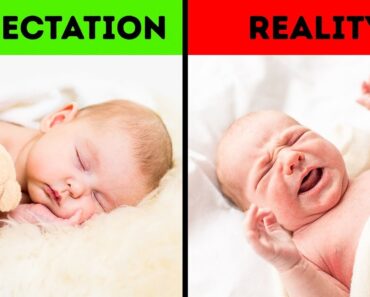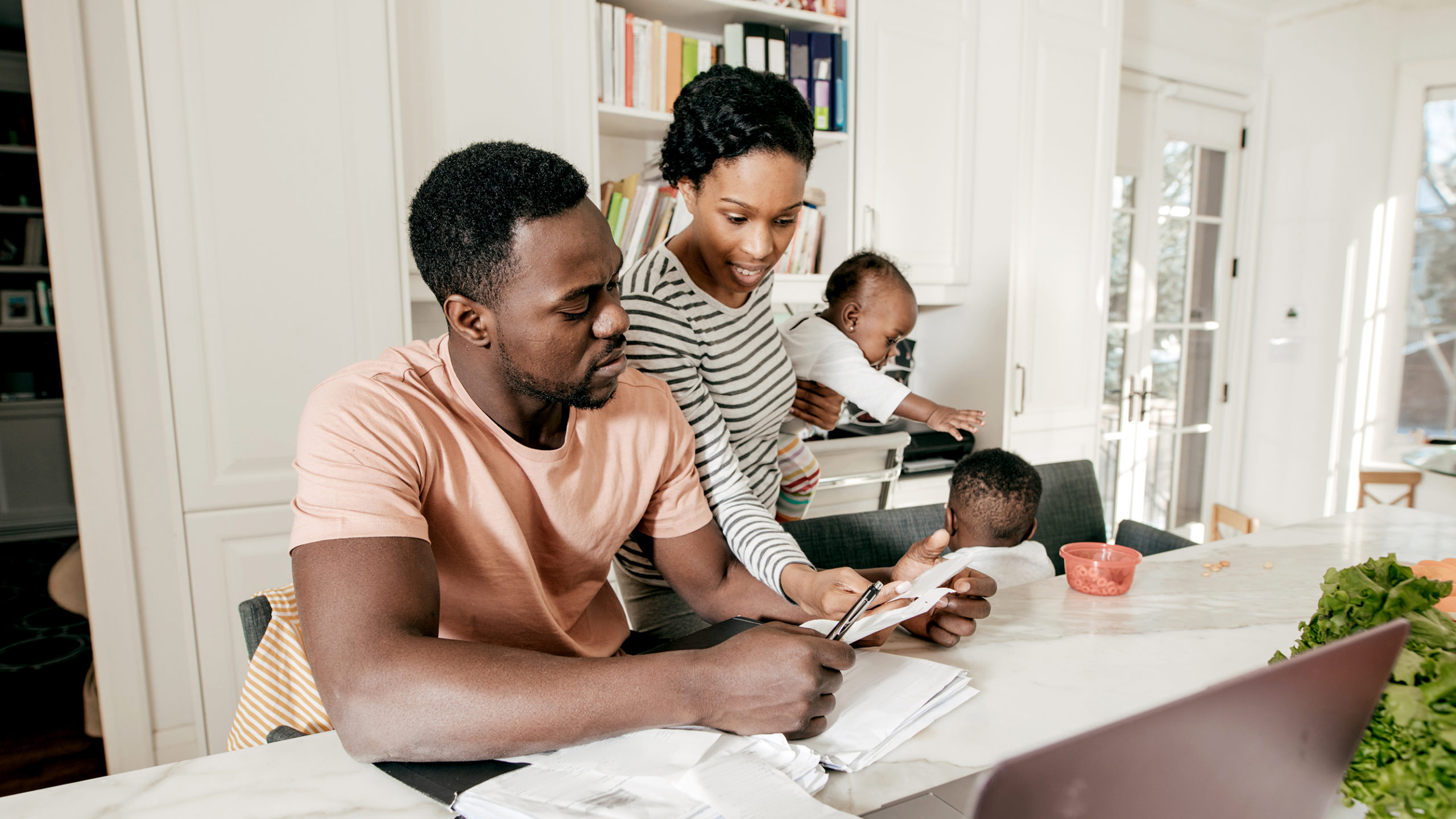Raise your hand if you’ve had to lower your parenting standards during the pandemic. Raise the other one if you’ve ever faked a bathroom break just to hide from your kids. Keep both hands up if you feel your soul slumping in defeat any time a Sourdough Mom—that’s what I call moms on Instagram who use words like “activated yeast” while I use words like “McCain Superfries”—posts pictures of steaming homemade loaves.
At least one of Beverley Rauch’s hands is likely up. More than a year later, the mom of two still isn’t sure how she got through that first traumatic lockdown, when she had to juggle a brand new demanding job—divisional vice-president of HR at luxury retailer Holt Renfrew—with her seven-year-old daughter’s home-schooling and her three-year-old yelling for her mom to wipe her bum during conference calls. “There were days where my husband and I sat down and I said, ‘OK, which one of us is going to have to quit our job?’”
Pandemic or not, if you have kids, you’re no stranger to chaos. So when I first heard the phrase “good-enough parenting,” I felt palpable relief, then curiosity, then outrage: Why isn’t this a household term? A movement?
Turns out good-enough parenting has been around since the ’50s, when the term “good-enough mother” was coined by British paediatrician and psychoanalyst Donald Winnicott. He used the term to describe the necessary process whereby a mother, who starts out hyper-responsive to her infant’s needs, naturally relaxes her responsiveness in healthy ways as the child grows and develops. But Winnicott recognized that adapting and readapting to a child’s ever-evolving needs for attention versus independence is no easy feat, and he reassured mothers that getting it perfect isn’t possible, nor is it the goal. In fact, as long as she’s usually reliable and her child is well-cared for, her “failures”—minor miscues and slip-ups—are par for the course. Being good enough (as opposed to perfect), he championed, ultimately fosters independence and autonomy in the growing child. He writes of the good-enough mother: “Her failure to adapt to every need of the child helps them adapt to external realities. Her imperfections better prepare them for an imperfect world.”
In our information age, when we look for reassurance that we are good enough, we usually get more parenting advice. My husband, Mark, and I don’t ascribe to a particular parenting style or movement (not out of a noble stance but out of sheer overwhelm), but we’ve skimmed enough material to second-guess all our decisions.
“You’re not supposed to tell Eli ‘good job’ so much,” I’ll tell Mark, exhausted after the kids’ bedtime.
“Why again?” he responds, yawning.
“Can’t remember, but apparently it’ll mess him up.”
I don’t know many people who identify as “good-enough parents,” which sounds like a stigma rather than a goal. But Winnicott’s “good-enough” wasn’t used to condone bare-minimum parenting, abuse or neglect. He definitely wasn’t campaigning for more parental failure to toughen kids up. He celebrated the everyday “ordinary devoted mother” as someone whose overall love and consistency would make up for her inevitable blunders along the way. Like many child experts, he recognized that parents aren’t machines and perfection is impossible, but he placed a value on minor parenting misses because of their rich teaching and learning potential. And if mothers in the ’60s were relieved to hear that perfection was an unfair and unproductive goal, I wonder how much his message needs to be repeated for our generation of aspiring supermoms. If we renewed Winnicott’s sentiment for parents in 2021, being “good enough” might be seen as a licence to be compassionate to yourself, as permission for mothers to consider compassion as a response to self-criticism—but not as an excuse to fail to meet your kid’s needs, of course. Could this be the reminder we need during the pandemic, when many of us have settled for different versions of our parenting styles than we’d imagined? Could it actually liberate us to become better parents?
Since everyone’s “good enough” is different, there is no universal blueprint for good-enough parenting. There is, however, lots of evidence to validate that a healthy child-parent connection isn’t contingent on your ability to expertly, peacefully levitate around your children, never yelling and definitely never crying on the other side of the bathroom door.
Good-enough emotional attunement
In her Ottawa family practice, registered psychotherapist Lauren Scarsella sees lots of stressed-out parents whose professional workloads didn’t subside when COVID hit, even as family life ramped up. Many of them feel like they’re failing when their kids experience any kind of distress, like when their kid has a tantrum or gets angry or frustrated. They feel that their kid’s joy is their job. “I use this term ‘good-enough parenting’ to remind parents that, actually, kids experiencing some level of distress is a normal—in fact, important—part of development,” says Scarsella. Extensively trained in attachment theory, Scarsella frames good-enough parenting in what she calls “the rule of thirds,” referring to American developmental psychologist Edward Tronick’s research in the 1970s and ’80s. Tronick observed that parwents are actually fully attuned to, or “in sync” with, their infants’ emotional needs only about 20 to 30 percent of the time. Another third of the time, parents are out of sync and drop the ball entirely, like when they just can’t figure out why their child is crying or angry, or when that child manages to console themselves despite the parent’s failed attempts or exasperation. But doesn’t that high fail rate affect kids? “The world is not actually attuned to our experiences as individuals,” says Scarsella. “So that micro-experience within the parenting relationship teaches children they will survive not being perfectly received 100 percent of the time.”
The most important rule of thirds, Scarsella emphasizes, is the final one, when, through trial and error, we manage to troubleshoot our way back to being in sync with our kids. “That internal experience of distress and resolving the distress is actually the thing that builds resilience [in children],” she tells her clients. Likewise, Tronick’s research concludes that the resolution process is what is responsible for healthy attachment. So in the context of meeting our kids’ emotional needs, being “good enough” is about hitting the bull’s eye some of the time, accepting that we can’t hit the bull’s eye all of the time and retrying to hit the bull’s eye even after we’ve just missed it.
Expectation vs. reality
Today, so much emphasis is put on creating idyllic moments for our kids, to the extent that we manufacture a litany of experiences to bring joy. My childhood sleepovers involved chips, VHS rentals and a basement full of hyper girls in old sleeping bags; now parents can hire slumber party companies to set up indoor tents with colour schemes, mood lighting and activity kits. It’s all so much pressure! Contrary to what you might think, today’s working parents spend more time with their kids than did housewives of the ’60s. A 2012 comparison study conducted by the University of California, Irvine, found that in most Western countries surveyed, the time parents spent with their kids had almost doubled for moms and quadrupled for dads since the’60s. Still, we have high expectations for how much time parents, especially moms, should devote to family life. But are we going overboard? Working moms might rest easier knowing their kids will end up just as happy in adulthood as kids raised by stay-at-home moms, says a 2018 Harvard study. In fact, the research shows that kids with working moms might actually benefit more in the long run, despite spending less time with their moms overall. And when it comes to spending precious time with our kids, other research has found that to maximize a teenager’s positive outcomes, six hours of family time per week will do it. That time doesn’t even need to be spent trying to get your teens to speak to you in more than monosyllables; the six hours can include dinner or time spent in the same room.
Moreover, there is increasing data that suggests parents are not as influential as we think we are in terms of psychological outcomes for our kids. Geneticist Robert Plomin’s life work studying twins challenges our assumptions about good parenting producing good kids, pointing to the evidence that the environment, though still influential, carries much less import than our genes.
It’s easy to take ourselves too seriously as parents and put too much stock in our own parenting. Right before my three-year-old took his first poop ever in the toilet, he announced, “Today is the day I’m going to face my fears.” My ego swelled, thinking one of my many pep talks had inspired his bravery and wise words. Nope. Turns out he got that line from Spider-Man. On TV. Another sober reminder that our kids are their own people.
Being good enough is a mom problem
“Good enough” is interpreted differently depending on whether you’re Mom or Dad—or so believe the strangers who occasionally approach my husband to congratulate him on his excellent parenting skills (while I have yet to receive a similar compliment from a stranger). Add to this the global pandemic, in which so much of the mental and physical load has been Mom’s problem, even while she works from home. In a recent Statistics Canada survey about the impact of the pandemic on parenting, women reported taking on the lion’s share, especially as it related to distance learning, which for many is where parenting and lockdown collide. Sixty-four percent of women and only 16 percent of men claim responsibility for this mammoth role. No wonder the New York Times set up a Primal Scream Line mothers can call to vent into a sympathetic voicemail. No wonder the fear and guilt of not being good enough is typically a mom problem, too.
Child and adolescent psychiatrist Sheila Harms sees a lot of guilt-ridden moms in her clinical practice at McMaster University in Hamilton, Ont. She reflects on how feelings of inadequacy often focus our attention in the wrong place: “Guilt isn’t therapeutic,” she says. “It can erode us like shame and embarrassment in a way that shuts us down.” Harms reframes parental self-doubt by putting an optimistic spin on it. Asking yourself, Am I doing OK? Am I doing enough for my kids? actually underscores that you want what’s best for your child. That’s a good thing, and can be taken a step further: “How can we see this as an opportunity to either repair or to see new outcomes that haven’t been previously seen?” says Harms.
Repairing our mistakes
When Harms talks about opportunities to “repair,” she’s using a common term in psych circles, referring to when we turn our mistakes into resolutions for change. Guilt won’t redeem us, but repair will. “If you were a perfect parent, that would be far more damaging to your child than the opportunity to make right what has gone wrong,” says Harms. “We do this by repairing, by going to your child and saying, ‘You know what, sweetheart? What happened when I did X was really not OK for you. Here’s why it wasn’t OK. I’m sorry, and this is what I’m going to do moving forward.’” Repairing, resolving or making amends is the crux of good-enough parenting because when we transform our mistakes and flaws into learning opportunities, we model problem-solving, creativity and emotional regulation for our kids, and there’s no greater classroom than the one within the walls of our own homes.
Beverley Rauch, the mom who struggled to balance e-learning with her new high-level job, saw the need for repair when her kids started hiding her and her husband’s computers and phones to get more attention. “We’ve had to schedule time to stop working and focus on our children. I told my daughter this morning: ‘When you get home, I’m going to end work early, and we’re going to sit and read Harry Potter for 30 minutes.’”
Setting boundaries to be good enough
Allana Robinson, a parenting coach, mother of two young boys, and military wife, often finds herself bearing the brunt of the domestic work when her husband is posted, even while she runs her own business from home. Out of necessity, the Petawawa, Ont., mom has to set boundaries with others, including the school board, so she can be good enough. When lockdown hit, she decided that online asynchronous learning was the only feasible option: “When the school comes to me with eighty thousand things to do,” she says, referring to the lesson plans she’s expected to teach her seven-year old, “I say, ‘No, no, no. We’re focusing on math, English and French. The rest, if he gets exposure to it, that’s great. It’s not going to be the end of the world.’”
With more than 10 years’ experience in the field as a registered early childhood educator, Robinson has numerous child development certifications that inform her parent-coaching strategies, weekly parenting podcasts, and presentations to daycare and kindergarten staff. She winces at our culture’s enrichment craze: “Parents feel their kids have to be doing something productive, enriched or academic at all times or else they’re going to lack education and not have all the advantages in life,” she says. She asserts that the most enriching thing younger kids can do is simply play. Researchers conducting early experiments on brain development emphasized the word “enrichment” when “play” would have been more accurate. “It’s really interesting,” she says, “how that small shift from play to enrichment has basically set off this entire over-parenting culture, where we believe that if we’re not constantly engaged with our kids that they’re going to fall behind.”
The pressure to constantly stimulate our kids is both unfounded and counterproductive, says Robinson, who has watched parents’ stress levels rise with the pandemic: “Because the very first things to shut down were schools and extracurriculars, parents have been compensating for that by trying to be the enrichment, the engagement and in their kids’ faces all the time.” But the greatest developmental benefits actually occur when children spontaneously enter what’s known as a “play state,” where they’re fully absorbed by an activity, imaginary world or game they’ve initiated or created, and not one that has been imposed on them. Her son, for example, loses track of time wielding a stick and being a superhero. This is why adult-free, independent play is a hallmark of Robinson’s parenting and parent-coaching practice. “Independent play is so important because it’s where children get to practise the skills they actually use in real life,” she says.
“They get to self-determine, create the plot, fail and fix their failures—it’s literally their dress rehearsal for life.” Ironically, she explains, too much adult-led play can have the opposite effect for kids, especially when we bring our own expectations and goals to the process: “What we’re actually doing is stifling our kids’ creativity, stifling their self-determination and stifling their ability to think critically.”
Robinson points out that play doesn’t just benefit kids: “It’s also very important for parents because we cannot be engaged with our children 24/7.” She maintains that independent play is what has saved her during the pandemic. She taught her boys, now four and seven, to play on their own since toddlerhood, including outside, where she monitors through a window. In her business, she coaches parents to create hazard-free and enclosed play spaces (including backyards), where parents can see their kids but not interfere, and use a timer to gradually increase their child’s playtime in five- to 10-minute increments. In her experience, it’s the parents who have a hard time giving their kids space to play independently, problem-solve challenges and navigate their emotions: “What that looks like in practice?” she asks, laughing. “Often it looks lazy. Parents are doers; we want to fix the problem. But the best way to fix the problem? You need to back off!”
Good enough trumps perfect
Rationally we know no parent or child is perfect, but that doesn’t stop us from striving for perfection or assuming meddlesome roles, like gatekeepers of our kids’ distress, or CEOs of their lives. But this is just helicopter, snowplow, lawn mower or even tiger parenting, which all fall under the notorious over-parenting umbrella. While there’s no damning evidence against good-enough parenting, research has long established that over-parenting can stunt our kids’ emotional growth and executive functioning, and it leads to anxiety, depression and feeling helpless.
Many of us dislike the idea of over-parenting and would deny that we’re part of it; I can’t be the only one who feels a sense of camaraderie with parents who are publicly forced into good-enough mode, surfboard-carrying their tantrumming toddler out of Costco. And we’ll rally behind the angry mom in the Facebook parenting group who yells in all caps: “A KID IN MY SON’S CLASS GOT A $20 BILL FROM THE TOOTH FAIRY!” But, for many, being in lockdown with our kids has probably revealed some of our own exhausting over-parenting tendencies and might have us questioning our assumptions or strategies. Do I shadow my kids too much? Are they too dependent on me? Why is everything so sticky?
Moving the goalposts
Mother of two and founder of the “Untigering” movement, Iris Chen made a radical move away from over-parenting when her eldest son was eight years old, rejecting everything she grew up knowing about parenting. “I started out believing that having well-behaved, obedient, high-achieving children was the definition of success and proof that what I was doing was good, but I began to see the harm in having those goals, those definitions of success,” she says, referring to her children’s anxiety, her own frustration and the mutual lack of trust and connection.
Where once she micromanaged every aspect of her children’s lives, she now nurtures their autonomy, and they have greater freedom to choose their activities, educational pursuits, bedtimes and more. This might sound radical, but she asserts that she’s not a permissive parent, and that she’s seen her kids, now 11 and 13, come around to making responsible choices once given the space to learn through trial and error. Her family meets weekly over a snack to get feedback from everyone. Her children’s input—even to her questions like “Is there anything that I can be doing better?”—is integral to her now collaborative, flexible and respectful parent-child relationship. As a result, Chen is doing less, but feeling more effective, fulfilled and loving as a parent.
Iris Chen coined “Untigering” to refer to the process of moving away from her “tiger mom” identity, a style of over-parenting aimed at producing highly skilled and successful children. The term “tiger mom” was first coined by Yale professor Amy Chua in her controversial book celebrating a stereotypically Asian-American parent-management style. This parenting style ultimately failed Chen, and prompted her to write her own book, Untigering: Peaceful Parenting for the Deconstructing Tiger Parent, as inspiration for parents trying to detach from the way they were parented, especially in homes where perfectionism and performance were tied to approval and love.
Chen sympathizes with the challenges of immigrant parents like hers, a status that can lead to an achievement-oriented parenting style. “Meritocracy is a myth,” she writes, about how often systemic racism interferes with those achievements anyway. “The game is rigged. We can refuse to offer our children up as tribute.” Good-enough parenting resonates with her, especially since her revised parenting goals celebrate everyone’s humanness: “I feel like a lot of over-parenting has to do with needing to be perfect, whereas peaceful, respectful parenting is about allowing ourselves to be human and allowing our kids to be human, with all our quirks and big emotions. It’s not that we’re always perfect, kind or patient as parents. It’s really allowing us to make mistakes, be human, be vulnerable, love ourselves and give grace to ourselves through this process, so instead of shaming ourselves, we can grow.”
For the love of humanity, we’re allowed to be flawed
I know I’m a good parent and that my kids are thriving. So why am I always “should-ing” myself? And why did the phrase “good-enough parenting” reverberate so deeply with me? Perhaps because it validates what I already know, and gives me permission to maintain realistic expectations for my family. Maybe a lot of us are actually closet good-enough parents, and our parenting intuition just needs a little nudge to topple our parenting ego. I, for one, would join a good-enough parenting movement, where, still being responsive parents, we show our kids that we’re all flawed, but we can work with those flaws, and where we teach our little humans how to be human.

































